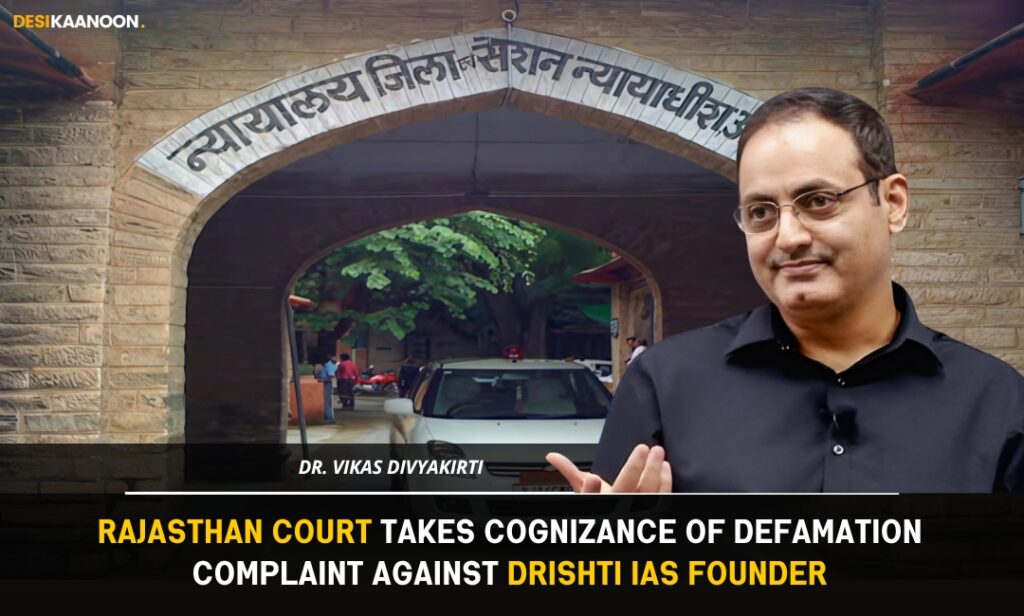Shreya Gupta
On 9th July, 2025, the Ajmer Court took partial cognizance of a complaint filed against Dr. Vikas Divyakirti, a public educator and the founder of Drishti IAS, in connection with a YouTube video titled “IAS vs Judge: कौन ज्यादा ताकतवर है | Best Guidance by Vikas Divyakirti sir Hindi Motivation”.
The complaint, lodged by Kamlesh Mandoliya, alleges defamation and public mischief under Sections 353(2), 356(2), (3), and (4) of the Bharatiya Nyaya Sanhita (BNS), 2023, and Section 66A(b) of the IT Act. While taking cognizance under BNS Section 356, which deals with defamation, the Additional Civil Judge and Judicial Magistrate No. 02, Ajmer, Justice Manmohan Chandel, observed that there exists prima facie strong evidence showing that Divyakirti, with a malicious intent to gain publicity, used derogatory and sarcastic language against the judiciary, including both judges and advocates. The court emphasized that, at the stage of cognizance, it is not necessary to assess whether a conviction is likely, but only whether the allegations warrant further legal action.
The Court noted that the video, allegedly circulated without Divyakirti’s consent, ridiculed the judiciary, thereby undermining its dignity, impartiality, and reputation. It concluded that such content could create distrust and confusion among the general public regarding the judicial system. Although the court dismissed other charges such as public mischief under Section 353(2) and did not accept the application of Section 66A(b) of the IT Act (which itself is struck down and unenforceable), it directed that the case be entered into the criminal register and ordered Divyakirti to appear in person at the next hearing.
Dr. Divyakirti, in his defense, claimed that he had no connection with the YouTube channel that uploaded the video and that the content was unauthorized, uploaded by a third party without his knowledge. He argued that he had not personally defamed anyone, nor targeted any identifiable individual or group. He also raised the issue of freedom of speech, maintaining that his video was a general commentary on public administration rather than an attack on the judiciary. However, the Court rejected this argument, citing precedents such as In Re: Arundhati Roy AIR 2002 SC 1375 and In re: Prashant Bhushan, 2020 SCC OnLine SC 698, which clarified that while freedom of speech is protected, it does not extend to speech that insults or undermines the dignity of courts.
Additionally, the court questioned Divyakirti’s lack of remedial action or regret, noting that he neither apologized, nor issued any notice to the third party for unauthorized uploading. The judge also emphasized that educators and public figures are usually aware that their speeches, especially in a professional setting, are likely to be recorded and distributed—often for a fee—and thus, cannot claim ignorance. Therefore, the court concluded that Divyakirti was likely aware of the video’s public dissemination and held that his defense lacked credibility.
The ruling highlights the delicate balance between free speech and respect for judicial institutions. While the court has not yet ruled on guilt or innocence, its decision to take cognizance underscores the seriousness with which allegations of defamation against the judiciary are treated, especially when such remarks are widely disseminated via social media and other public platforms.
The NDOH for the present matter is scheduled for July 22, 2025.
Case Title: Kamlesh Mandoliya v. Vikas Divyakirti
Case Number: F.O No. 1991/2025
Bench: Justice Manmohan Chandel
Click here to access the Order.
Instagram: Click here
LinkedIn: Click here
For Collaboration and Business: info.desikaanoon@gmail.com

